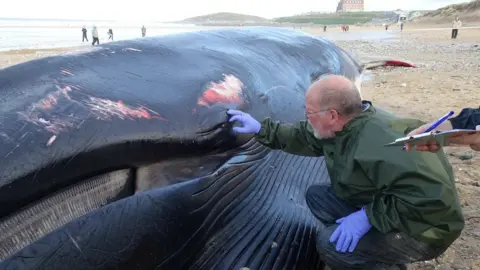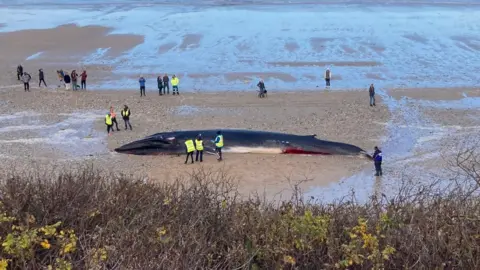Fin whale stranded on Fistral 'probably died of measles type virus'
 Cornwall Marine Pathologist Team
Cornwall Marine Pathologist TeamA 16m (52ft) fin whale found dead on a Cornish beach is likely to have died of a measles type virus, pathologists have concluded.
The creature was found washed ashore at Fistral beach in Newquay on 15 November.
Following a post-mortem examination scientists found the whale had a morbillivirus, which is closely related to measles in humans.
The virus has caused epidemics in other marine animals.
Veterinary pathologist James Barnett, from the Cornwall marine pathology team, said: "The fin whale had an inflammation of the brain.
"We need to do some further testing to work out exactly the cause, but it's likely to be a morbillivirus, the most closely related human form is measles."
 Newquay Activity Centre
Newquay Activity CentreThe morbilliviruses are highly contagious and have caused epidemics in pilot whales and striped dolphins in the Mediterranean during the 1990s and 2000s, he said.
They have also affected bottlenose dolphins off the Atlantic coast of the US in the 1980s and 1990s.
The viruses have also previously been reported in fin whales, harbour porpoises, killer whales and several other cetacean species.
The juvenile female fin whale could have caught the virus from any infected whale or dolphin, Mr Barnett said.
"The concerns are it illustrates the fact the virus is a problem for this species and will cause mortality in this species," he said.
"They are a vulnerable species anyway and are still potentially recovering from the mass losses that occurred during commercial whaling, so it's a species we need to try to protect as much as possible.
"But obviously infectious diseases there's very little we can do about it and it will potentially have a knock on effect on the numbers in this species."

Follow BBC Cornwall on X (formerly Twitter), Facebook and Instagram. Send your story ideas to spotlight@bbc.co.uk.